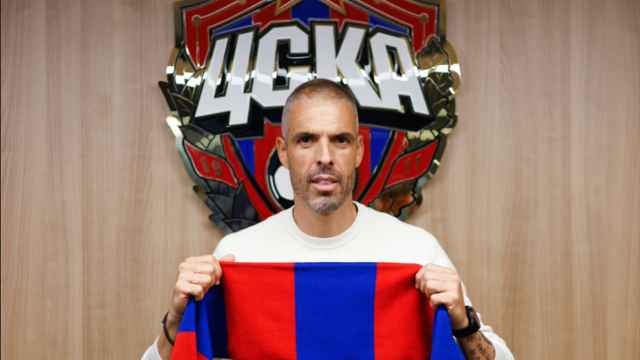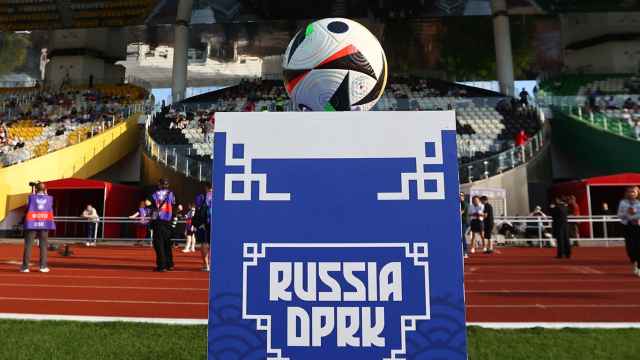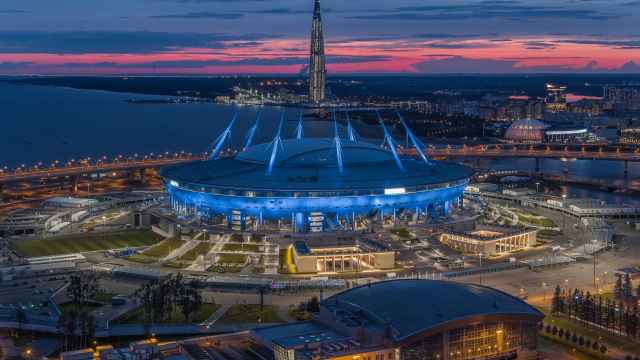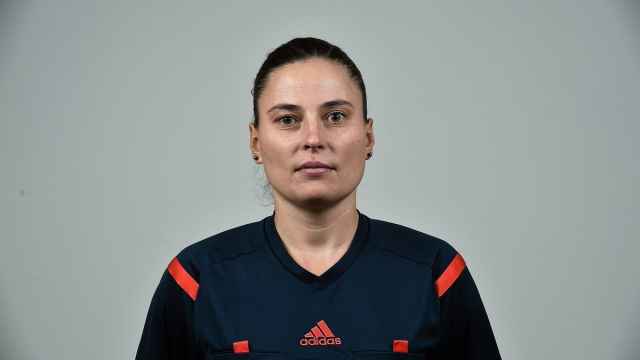Artyom Dzyuba and Alexander Kokorin should have been celebrating together in St. Petersburg last weekend. They are both strikers for FC Zenit St. Petersburg and the Russian national team, regarded as talented and technically gifted enfants terrible. But, at Zenit’s title party last Sunday, only Dzyuba was present, draped in a celebratory golden jersey, lifting the Russian Premier League trophy aloft at the Gazprom Arena. Kokorin, meanwhile, remains in jail, after being sentenced to 18 months behind bars for his part in two assaults last October.
Over the past year, Dzyuba and Kokorin’s fortunes diverged, as Russia’s relationship with its footballers appeared to have changed for good. A little over a year ago, Kokorin was thought to be the country’s most valuable striker heading into the 2018 World Cup, hosted by Russia for the first time in history. But in March 2018, the talented striker was ruled out of the tournament after tearing the ligaments in his right knee in a match for Zenit.
The Russian football public’s mood, already pessimistic, soured further. Very few people in Russia had any hope for a promising performance at the tournament. Russia’s players, they said, were pampered, spoiled and too far removed from the constituency they were supposed to represent on the pitch.
Artyom Dzyuba did much to change that. Months before the World Cup, he was on the outside looking in, left out of most of Russia’s pre-tournament matches. But with Kokorin’s injury and Dzyuba’s good form in the concluding stages of last season, national coach Stanislav Cherchesov changed his mind and Dzyuba was included in the World Cup squad. From there, he conquered Russian hearts and minds, scoring two goals in the group stages and a crucial penalty against Spain that pushed Russia into the quarter finals of the World Cup, sparking mass enthusiasm for football across the country.
More than his performances, though, Dzyuba captured the affections of Russian football fans by appearing to be just like them. He remained humble while living out his childhood dreams on the pitch, shared by Russian football fans across the country. His ebullient personality, previously thought as brash, perhaps even arrogant, was recast as colourful and funny. Before the penalty shoot-out in the quarter-final against Croatia, Dzyuba roused his team-mates by giving a passionate speech, wide-eyed and wild armed. His words, “guys, I love you”, resonated on social media long after Russia’s loss in the game. More than anyone, Dzyuba was the man who returned the Russian national team back to the people.
Now, Dzyuba has won Russia’s Premier League for the first time in his career. He is Russia and Zenit’s leading star. His talent was again showcased in Zenit’s 3-1 win over CSKA Moscow last weekend. Dzyuba provided three assists, with delicate, deceptive flicks of his boot. After the match, the title party began, and Dzyuba celebrated on the pitch with his manager Sergei Semak, his team-mates and his young family.
The top of the table
Zenit led the way for much of this season, never looking like being caught. The other teams around the top of the table, FC Lokomotiv Moscow, FC Krasnodar, FC Spartak Moscow and PFC CSKA Moscow could not keep up the pace.
Of the challengers, Krasnodar have probably had the brightest season. They have a young squad, typified by the emerging talent of Magomed Shapi Suleymanov, a scuttling, pacey winger, and a young manager, Murad Musaev. They also have, according to widespread opinion, the best stadium and best academy in Russia, built by their patron, Sergei Galitsky, the former owner of the Magnit shopping chain.
Last season’s champions Lokomotiv Moscow, managed by the wily Yuri Semin, have ended the season well, reaching second place and the final of the Russian Cup. They now have the chance to atone for their disastrous Champions League campaign, during which they were knocked out of the group stage without ever really laying a glove on any of their opponents.
Spartak have had what might now be described as a typical Spartak season. They sacked their coach, Massimo Carrera, after a spat with captain Denis Glushakov divided the fanbase between the pro-coach and pro-captain faction. Their new manager, Oleg Kononov, has seen his side’s performances fluctuate, with each result greeted as a crisis or the dawn of a new golden age by the heavily-represented fans of Spartak in the Russian sports media.
CSKA, meanwhile, saw many of their star players leave at the end of last season, reshaping the squad with a number of young players. They have had a strange season, with two victories in the Champions League over Real Madrid, a win over Zenit, an away victory over Spartak but also the real possibility that they may finish in sixth place in the league and will miss out on European football next season.
Record attendances
Lower down the Russian football pyramid, the World Cup buzz has bled into the domestic league season, as stadiums in World Cup cities like Yekaterinburg and Samara continue to host teams with enthusiastic support.
Fans have come out en masse for a chance to see their World Cup heroes, like Dzyuba and Igor Akinfeev, in the flesh. While many still look to Lionel Messi and Cristiano Ronaldo for inspiration, there is obvious admiration closer to home.
The average number of match-going fans went up across the board when compared to the season before the World Cup. Champions Zenit broke a 35-year record for the highest attendance in St. Petersburg last weekend in their match against CSKA, with 61,494 coming through the gates, while average attendance of Zenit games has grown from around 44,000 to just under 48,000 this season. At Spartak, CSKA and Lokomotiv, average attendances also rose. At Rostov, in their new World Cup stadium, the average number of fans through the turnstiles more than doubled from 12,730 in 2017-2018 to 30,709 in 2018-2019.
Most World Cups leave legacies of stadia, infrastructure and memories. In Russia, as this Premier League season has demonstrated, the 2018 World Cup also left something more intangible, as perceptions changed and bonds were reformed between Russia’s footballers and its fans.
A Message from The Moscow Times:
Dear readers,
We are facing unprecedented challenges. Russia's Prosecutor General's Office has designated The Moscow Times as an "undesirable" organization, criminalizing our work and putting our staff at risk of prosecution. This follows our earlier unjust labeling as a "foreign agent."
These actions are direct attempts to silence independent journalism in Russia. The authorities claim our work "discredits the decisions of the Russian leadership." We see things differently: we strive to provide accurate, unbiased reporting on Russia.
We, the journalists of The Moscow Times, refuse to be silenced. But to continue our work, we need your help.
Your support, no matter how small, makes a world of difference. If you can, please support us monthly starting from just $2. It's quick to set up, and every contribution makes a significant impact.
By supporting The Moscow Times, you're defending open, independent journalism in the face of repression. Thank you for standing with us.
Remind me later.






